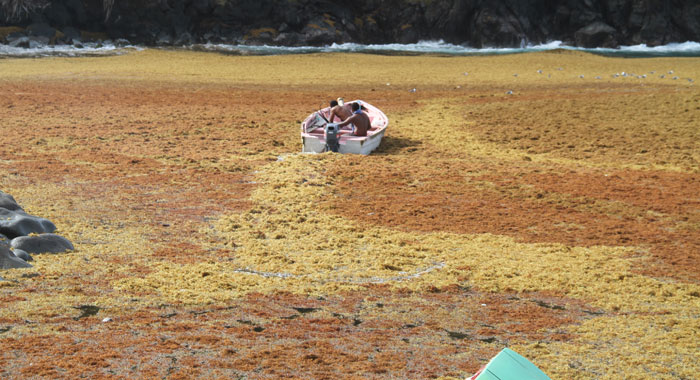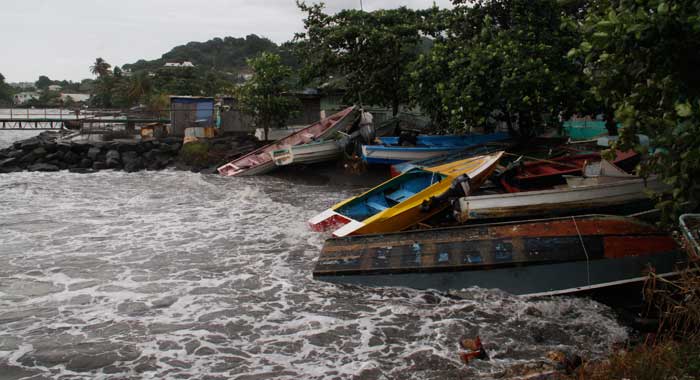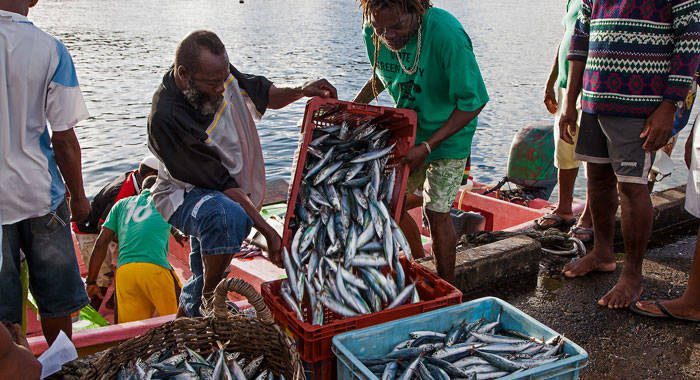By Kenton X. Chance
BRIDGETOWN, Barbados — While the impact of climate change on land in the Caribbean has been well-documented, not so much is known about its effect on the region’s marine resources.
“Climate change is a major threat for the marine fisheries sector, the marine ecosystem and the livelihoods of the coastal communities that harvest the fish and process and export,” says Milton Haughton, executive director of the Caribbean Regional Fisheries Mechanism.
He made the observation during an interview on the sidelines of Caribbean Week of Agriculture last month.
A protocol on Climate Change Adaptation and Disaster Risk Management in Fisheries and Aquaculture was approved for CARICOM States at the 8th Special Meeting of the CRFM Ministerial Council in Barbados during Caribbean Week of Agriculture (CWA 2018).
The ministers approved the protocol to the Caribbean Community Common Fisheries Policy (CCCFP) which promotes cooperation and collaboration among Caribbean people, fishers and governments in conserving, managing, and sustainably using fisheries and related ecosystems, as well as improving the welfare and livelihood of fisherfolk in the region.
Haughton said: “This protocol is of paramount importance in the region, given the urgent and ever-increasing threats to fishing communities, fishers and the health of marine ecosystems and associated fish stocks in the region posed not only by warming waters and climate change, but also by the acidification of the oceans as a result of increased absorption of carbon dioxide from the atmosphere.”
Haughton said that among the obvious challenges that climate change presents are the bleaching and destruction of corals reefs, frequent massive blooms of sargassum and other harmful marine algae, and the devastation caused by storms, hurricanes and floods that states must now contend with.
Consideration of a protocol on climate change and disaster risk management in the fisheries sector.
He told iWitness News that the fisheries sector has been impacted negatively from some of the direct and more obvious events, such as the storms and hurricanes that have devastated the countries.
Marine resources have been impacted, including seagrass bed and mangroves, which are important for the livelihoods of fishers
“After Hurricane Maria, some researchers dived on some of the reefs and it was amazing when you look at some of the pictures. Where you had health reefs, you go back and almost nothing – rubble,” he said.
“The point is, once you have these severe weather systems, whether it is floods, as occurred in Guyana, you then have a lot of debris and pollutants coming down in flood waters and it all ends up in the marine environment.”

For eight years now, the region is dealing with the invasion of sargassum weed, which is believed to be climate related.
The waters are warmer and support the growth of these plant-like organisms, Haughton said, adding that the sargassum blooms are believed to be as a consequence of nutrient enrichment from agriculture which ends up in the sea through floodwater runoff accumulating in the oceans.
“One of the problems we have not heard a lot about, not in the Caribbean at least, is this issue of ocean acidification.”
This is caused by the increase of carbon dioxide in the atmosphere being absorbed into the ocean and some people thought that was a good thing.
“But in more recent times, scientists have realised that the absorption of carbon dioxide in the ocean is actually causing serious, serious problems in the ocean itself. Basically, the seawater is getting more and more acidic and that is not good for the organisms in the ocean.”
This impact is not fully understood but the initial impacts were seen in shellfish, which require carbonate in the water to make their shells, Haughton said.
“And the acidic water was dissolving the shells, in some cases, especially of the small planktonic species,” he further explained, adding, “We are seeing impacts on the entire food chain and marine environment.”

However, in the Caribbean, very little research has been done on acidification, the CRFM director said, adding that this has to change.
“… from all indications, it is a problem not just in other parts of the world. It is a problem in the Caribbean too,” he said of ocean acidification.
Haughton further noted that when sargassum seaweed rots, it releases acidic gases, making the ocean more acidic and less favourable for marine life.
“It’s a very complicated arrangement. What we do know is that climate change and warming water is resulting and is predicted to result in a shift in the distribution of fish from the tropics and more to the poles. It is cold, but it is getting warmer, so when the tropics gets too hot for them, they are able to find suitable habitats further north…
“We have to look at the impact on our human communities — our fisher folk, where they live. They live right on the coast in most cases, and their production apparatus, including aquaculture facilities are in the coastal areas,” he said, adding that some preliminary work in being done in Belize.
“We are seeing changes in the marine environment. We see fluctuations in certain fish stocks. We are not certain what is causing some of these things. Just like the sargassum, we have theories as to exactly what is contributing, but, we are not sure and until you do the research, which we have not yet done, you will not be able to make the link between what you see and what is happening and some of the problems.”
He said experts say coral bleaching is probably due to the warming but increasing acidification could be a factor.
“We have to look at it in a scientific manner to make that connection. So, globally, it’s an area that has not received much attention as climate change generally impacts on land but I think now, scientists are beginning to focus more attention,” Haughton said.







Climate change the great believe able lie of the United Nations he who controls the climate , weather control life on the Earth thus playing God on Earth this Satanic one world order is controlled and rule over by Satan and his children this is his final world power and it is a deception not what it proclaimed to be for it true agenda is hidden wake up christian the end is sooner rhat you think salvation is for your soul Take it now !!